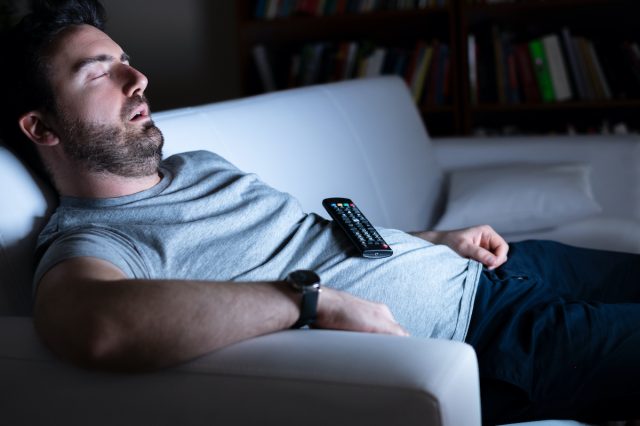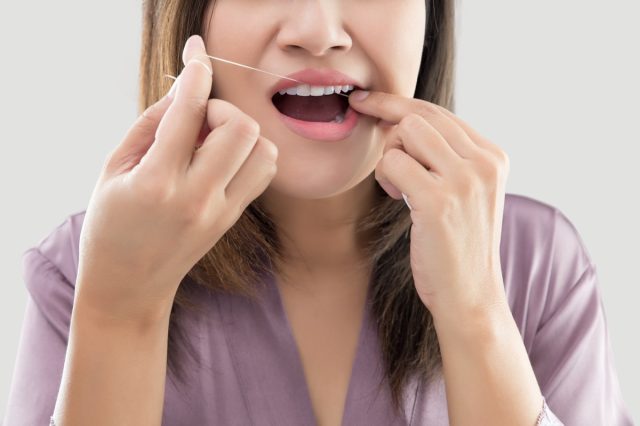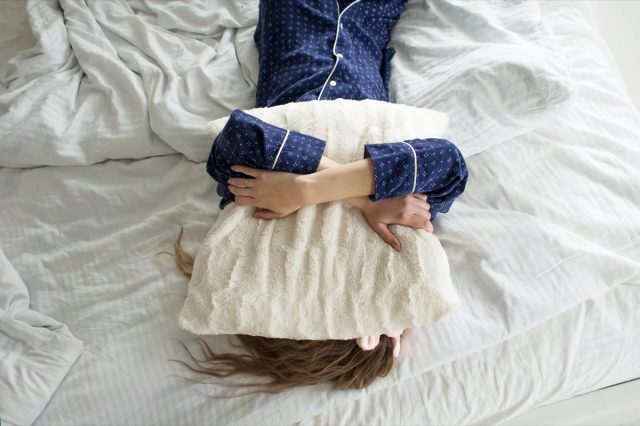We all have picked up bad habits here and there, but some behaviors can create more stress on our body than we realize. The good news is, if we just make a few positive lifestyle changes, we can stay healthier longer. Eat This, Not That! Health spoke with experts who reveal ways we're ruining our body and bad habits we need to kick immediately.
Eating Before Bed

Sean Marchese, MS, RN, a registered nurse at The Mesothelioma Center with a background in oncology clinical trials and over 15 years of direct patient care experience shares, "Eating a large meal or high-calorie foods before bedtime can negatively impact your quality and quantity of sleep. If you wait to sleep for about two to three hours after a meal, it gives your stomach time to process food before it moves to the small intestines for further digestion. Eating just before bed can also cause heartburn or symptoms of gastroesophageal reflux, especially if you sleep on your back. Nighttime heartburn is the feeling of burning or pressure in your upper chest, throat or esophagus. A late dinner also releases insulin, a digestive hormone that can shift your circadian rhythm and sleep cycle by associating food with wakefulness."
Too Much Screen Time

Marchese reveals, "Binge-watching your favorite show or spending hours with that new video game can be a wonderful distraction, but the impact on your health could be detrimental. Many Americans know that TV, computer and smartphone time means less activity and an increased risk for heart disease and diabetes. However, too much screen time can also increase your risk for cancer. An active lifestyle improves hormone and immunity balance, reducing the chance of developing certain cancers. Most Americans could benefit from lowering screen time and getting about two to three hours of exercise every week."
Poor Oral Hygiene

According to Marchese, "Surveys have found that only about 30% of Americans floss daily, and another 32% don't ever floss. Poor oral hygiene is linked with multiple cancers of the mouth, known as oral squamous cell carcinomas. Alcohol and tobacco use significantly increase this risk. Dentists recommend brushing twice daily but avoiding aggressive movements or hard-bristled toothbrushes. Other tips for good oral hygiene include flossing daily, seeing a dentist for regular cleanings, and avoiding sugary foods and drinks."
Excessive Texting

Dr. Neel Anand, MD, MCh Orth, professor of orthopaedic surgery and director of spine trauma at Cedars-Sinai Spine Center in Los Angeles shares, "Though text neck is not a clinical diagnosis, the theory behind it is intriguing and concerning. Research suggests that as the downward angle of the head increases (the way it must when we're constantly looking down at our phones and other devices), so does the amount of weight the neck is forced to carry as a result. For example, the head placed at a 60-degree angle forces the cervical spine (neck) to hold the equivalent of 60 pounds. To put those numbers into perspective, the design of the cervical portion of the spine (your neck) is such that it is strong enough to carry your skull. The average human skull weighs about 12 pounds. In effect, these torqued angles we're placing our necks at are putting up to five times the amount of pressure on them than they were designed to hold. All those hours spent staring down at our smartphones is causing trouble for spinal alignment and we're feeling the painful effects of it in the neck and in the back, especially when we sleep. If you sleep on your back with your head bent forward or on your side with your head significantly bent to the side, you may exacerbate your current neck pain."
Bad Pillows

"Look for a pillow that keeps your neck parallel to the mattress and that adapts to your specific sleep position," says Dr. Anand. "Cervical contour pillows are extremely effective for most because your neck rests on a less elevated side when lying on your back or on a more elevated side when sleeping on your side. Foam contour pillows are also a great option. Keep in mind, if you have a firmer mattress, you will need a thicker pillow because there is less cushion for your shoulder to sink into and thus there is a greater space between your mattress and head. Now, if it is a memory foam mattress, you will need just the opposite. A thinner pillow is needed to compensate for your shoulder sinking into the bed."
Running on Wrong Pavement

According to Dr. Anand. "Whether it's concrete or paved asphalt, running on hard ground is incredibly hard on your joints and spine. Many distance runners say they feel a difference between the impact of running on cement sidewalks versus running on concrete roads. But whichever you choose, (or are stuck with depending on where you live) you're still running on a very hard surface. In fact, some studies have shown that people who run solely on pavement may have a higher incidence of back pain from running long-term. So what do you do about it?
Vary your workout. Try to find a dirt trail to run on. Step off the path at the park and run in the grass. Running on softer surfaces like this will help in not jarring your spine with every footfall as much as running strictly on pavement can. You'll also benefit from getting stronger legs, as the softer ground gives more and requires more energy, strength and effort to push forward on."
Not Having a Support System in Your Household

Dr. Sarah Rettinger, MD, endocrinologist at Providence Saint John's Health Center in Santa Monica, CA emphasizes, "Make sure that everyone in your household is on the same page about your health. If you are trying to get up and move more, or eat better, make sure your family and friends are on board as well. It's hard enough to eat healthfully sometimes, you don't want a family member bringing in doughnuts or making late-night ice-cream runs. It's easier to stick with healthy habits when others around you are as well."
No comments:
Post a Comment